

Talleres de tecnología creativa. Maker Camp: Next Generation Toys. Paper Circuits: Diving in with Visitors. Global Makeathon. Get ready for a very full day!
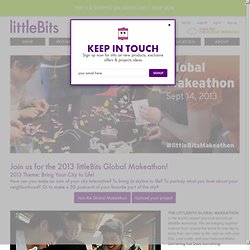
Register for a local meetup or participate online through Google+ Hangouts . 'Immediate Objects: Explorations in 3D Printing' at the School at the Art Institute of Chicago. Advanced Manufacturing Research Institute. Minibloq. New national curriculum to introduce fractions to five-year-olds. The education secretary Michael Gove's efforts to revolutionise learning in England's schools will see five-year-olds studying fractions and writing computer programs in their first year of school, according to final versions of the new national curriculum published on Monday.
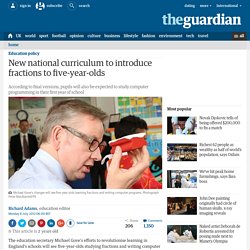
Among the changes are a requirement for 3-D printers to be used in design and technology lessons, after major revisions to the subject's curriculum. According to a Whitehall source: "Three-dimensional printers will become standard in our schools – a technology that is transforming manufacturing and the economy. Combined with the introduction of programming, it is a big step forward from Labour's dumbed-down curriculum.
" The latest versions of the national curriculum include revisions to drafts that were fiercely criticised when they were published in February. Subjects such as history and geography have had massive rewrites from their initial drafts. The new national curriculum is to be used from September 2014. Les petits hackers, qu'est ce que c'est ? Je vais vous parler d’un projet(activité) que j’ai initié : Les petits hackers .
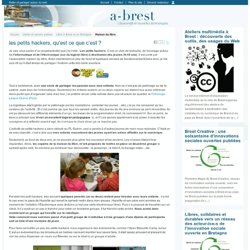
C’est un club de bidouille, de bricolage autour de l’informatique et de l’électronique (sur du logiciel libre) à destination des jeunes (9-18 ans) . Il est porté par l’association maison du libre. Avec maintenant un peu de recul et quelques années de fonctionnement(3ans env), je me suis dit qu’il était temps de partager l’histoire cette très belle aventure. Tout a commencé, avec une envie de partager ma passion avec mes enfants . An 11-year-old inventor and his 3D printer (video) Verkstad English - HomePage browse. Circuits.io. The Makery. Hackidemia. How to 'Make' Real Learning Happen.
The problem was obvious: a round of bottled soda and not an opener in sight.
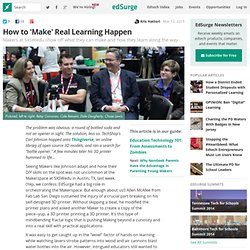
Re-“Making” Education. This is the age of the maker.
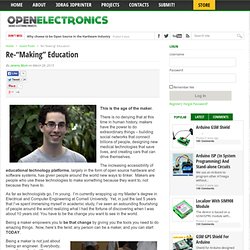
There is no denying that at this time in human history, makers have the power to do extraordinary things – building social networks that connect billions of people, designing new medical technologies that save lives, and creating cars that can drive themselves. The increasing accessibility of educational technology platforms, largely in the form of open source hardware and software systems, has given people around the world new ways to tinker.
Makers are people who use these technologies to make something because they want to, not because they have to. Georgia Tech’s Makerspace is a Model for Higher Education. Inside Georgia Tech’s Invention Studio.
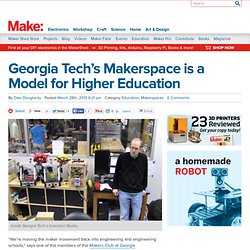
“We’re moving the maker movement back into engineering and engineering schools,” says one of the members of the Makers Club at Georgia Tech’s Invention Studio at the end of the video below. The Invention Studio is a campus-wide makerspace open 24 hours to any faculty, student, or staff member and project, not just those in classes. The Invention Studio has $500,000 of equipment in 3,000-square feet. There are over 500 users per month now. We are the robots. Tags: CompluibotEduardo GallegoIván GallegoNerea de la RIvaRobótica La versión joven y robótica de la selección española de fútbol está en Alcalá de Henares.
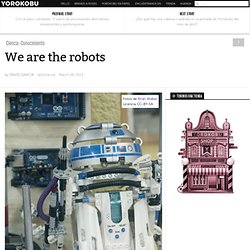
Allí, en un aula repleta de cacharrería del colegio Miguel Hernández, Eduardo e Iván Gallego y Nerea de la Riva llevan más de una década investigando acerca de mecánica, inteligencia artificial y metodología de la divulgación de, entre otros, estos conceptos. Complubot es una asociación sin ánimo de lucro que comenzó en formato unipersonal tanto en esfuerzo como en financiación. Adafruit launches educational show aimed at kids. Raspberry Pi in schools. This term, we’ve started to see the beginnings of school applications of Raspberry Pis.
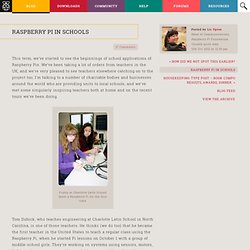
We’ve been taking a lot of orders from teachers in the UK, and we’re very pleased to see teachers elsewhere catching on to the project too; I’m talking to a number of charitable bodies and businesses around the world who are providing units to local schools, and we’ve met some singularly inspiring teachers both at home and on the recent tours we’ve been doing. Pupils at Charlotte Latin School meet a Raspberry Pi for the first time Tom Dubick, who teaches engineering at Charlotte Latin School in North Carolina, is one of those teachers.
He thinks (we do too) that he became the first teacher in the United States to teach a regular class using the Raspberry Pi, when he started Pi lessons on October 1 with a group of middle-school girls. Workshop in the Artlab for ECV students. Hot Bots: How Arduino Teaches Kids the Science behind Modern Gizmos. Guest post by Michael R.
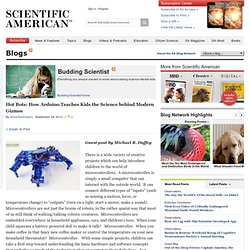
Duffey There is a wide variety of creative projects which can help introduce children to the world of microcontrollers. A microcontroller is simply a small computer that can interact with the outside world. Every Child a Maker @makerfaire. COMPLUBOT. Aprender a través del diseño y la fabricación digital. Seminario de formación del profesorado en fabLAB Asturias.
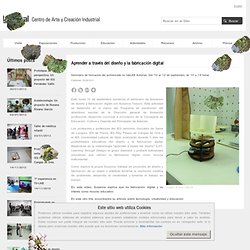
Del 10 al 12 de septiembre, de 10 a 14 horas Este lunes 10 de septiembre comienza el seminario de formación de diseño y fabricación digital con Susanna Tesconi. Esta actividad se desarrolla en el marco del Programa de prevención del abandono escolar de la Dirección general de formación profesional, desarrollo curricular e innovación de la Consejería de Educación, Cultura y Deporte del Principado de Asturias. News Story. At the Marymount School of New York, where technology integrator and teacher Jaymes Dec prefers “exploration through technology” over standard lectures, eighth-grade students learn how to solder by making wire sculptures. (Jaymes Dec) The “maker” movement’s roots are scattered across the country, in garages, basements, and workshops; the seeds sown among spare parts, untried ideas, and experiments—successful and failed. “From a science and technology point of view, [making is] a gateway to STEM (science, technology, engineering, and mathematics),” says Dale Dougherty, the founder of MAKE magazine and Maker Faire, an event created by MAKE to “celebrate arts, crafts, engineering, science projects, and the Do-It-Yourself mindset.”
Dougherty, who also serves on the board of advisors of the Maker Education Initiative (Maker Ed), adds, making “provides a context for science and technology and helps [students] do something they’re already interested in doing.” Free online course on building a simple Raspberry Pi OS from the University of Cambridge. This summer, the University of Cambridge Computer Lab has been home to a small group working on projects with the Raspberry Pi. Alex Chadwick is one of those people, and he’s produced this: a free course on building a very simple operating system for the Raspberry Pi in assembly language. The course opens with some explanations about what assembly language is – and, importantly, what an operating system really is; you’ll learn some new concepts and possibly some new terms, and then you’ll dive headlong into practical work.
You will work through sessions which teach you how to enable and manipulate one of the board’s LEDs, then learn some graphics theory and start generating lines, text and random numbers. Eventually you’ll be manipulating text to display computed values, and learning how to build your own command line interface. Many thanks to the University of Cambridge Computer lab for making the course available, and especially to Alex.
Training - RepRapPro. Makerbot Curriculum. Youngmakersprogram. Makerspaces in Education and DARPA. Recently, Mitch Altman announced publicly that he’s not participating in Maker Faire this year because MAKE received a DARPA award for education. I have talked to Mitch and shared in detail our proposed work. I have listened to him express his concerns about the DARPA award. I don’t agree with Mitch, but I respect his opinion. I believe that Mitch’s public statements do not fairly characterize the program and have caused confusion about DARPA’s role. I’d like to explain what we’re doing and why. In 2011, Saul Griffith and I, representing Otherlab and O’Reilly Media’s MAKE division, respectively, learned that DARPA selected our MENTOR proposal to bring the practices of making into education and extend the maker movement into schools.
The DARPA award challenges us to establish the practices of making in high schools, reaching 1000 schools over four years. Here are the major areas of work we have under development as part of the Makerspace program: Kids and 3D printing. Learn at SparkFun Electronics - Learn.SFE. Creating a space for young makers and educators.